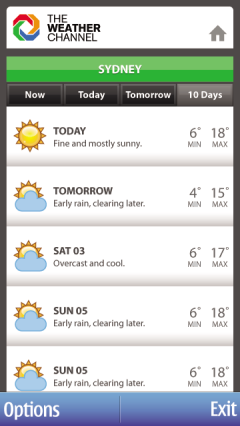TigerSpike business is platform agnostic, delivering mobile device and tablet apps to all the major platforms. The company’s client base has historically been among media companies and telcos, but it’s seeing increased interest from enterprises. These enterprises are recognising the opportunities to leverage mobile devices for internal communications, documentation delivery, and CRM.
Richard: Is your work with Qt and Symbian devices something that’s being driven internally or by client requests?
Chris: It’s a bit of both. Our goal is to be platform agnostic, so we like to make sure that our development teams are skilled up across all the major platforms. We have created a number of Symbian WRT apps recently, which has leveraged our .NET skills. We have come to Qt more recently and we are currently developing an app for an Australian operator. However, most of our client requests are focusing on iOS, but we are seeing good interest in Android, Nokia, and RIM apps too.
Richard: Do you see this as a progression from WRT to Qt, or would you expect to continue with both technologies?
 That said, we tend to use WRT for utility style apps that are web data based. For example, we have just completed a WRT application for the Weather Channel. Qt comes in where we need more grunt, such as in games or apps that need a light device resident database. Also Qt gives us the capability of working more closely with the features on Symbian devices, using the mobility APIs. This is important when it comes to creating richer, more integrated applications.
That said, we tend to use WRT for utility style apps that are web data based. For example, we have just completed a WRT application for the Weather Channel. Qt comes in where we need more grunt, such as in games or apps that need a light device resident database. Also Qt gives us the capability of working more closely with the features on Symbian devices, using the mobility APIs. This is important when it comes to creating richer, more integrated applications.
Richard: How are you finding Qt compared to other platforms your company works with?
Chris: While it’s early days for Qt and the mobility APIs, as we understand there many more features arriving in 2011, there are definitely some nice things about Qt: the graphics library and database as examples. In general the tools seem comparable with other platforms, as I’ve not had any overtly positive or negative feedback from our developers. But in many respects we are ramping up our Qt development so I think we will really start to gain an understanding later this year, particularly when some of the new features (such as Qt Quick) are available in the tools and on devices.
Richard: Do you make much use of Ovi store? What are your impressions?
Chris: We do use Ovi Store, as some of our clients leave the submission to us. We have a really good relationship with Nokia, so we are able to alert them to the fact that we will be submitting an app and the guys at Ovi store can be ready to do the approval. Perhaps the key differentiator for us is that the Ovi store submission and approval process is more transparent than that of some competitors. It’s also somewhat quicker than the Apple store, where we have to plan for submission and approval taking two weeks.
Richard: You mentioned support from Forum Nokia, how does that work in Australia when the nearest Forum Nokia office is in Singapore?
Chris: Very well, we use the local team as a conduit and it seems to work. Obviously we try to rely on our own skills to resolve issues in the first place, but when that does not work Forum Nokia always comes to the rescue. From a non-technical point of view, we also get very good support from the local Nokia team. Even simple things, such as being able to introduce our clients to the local team, are very useful.
Richard: What do you see as the key things Nokia needs to do to encourage businesses like yours to work with Nokia platforms in 2011?
Chris: Both from a development and client perspective, it’s clarity on the future path forward. We need to know Qt will be supported across a broad range of Nokia devices. It will then be much easier to confidently recommend Qt and Nokia devices to clients as a platform for their apps.
Richard: Thanks, Chris!
